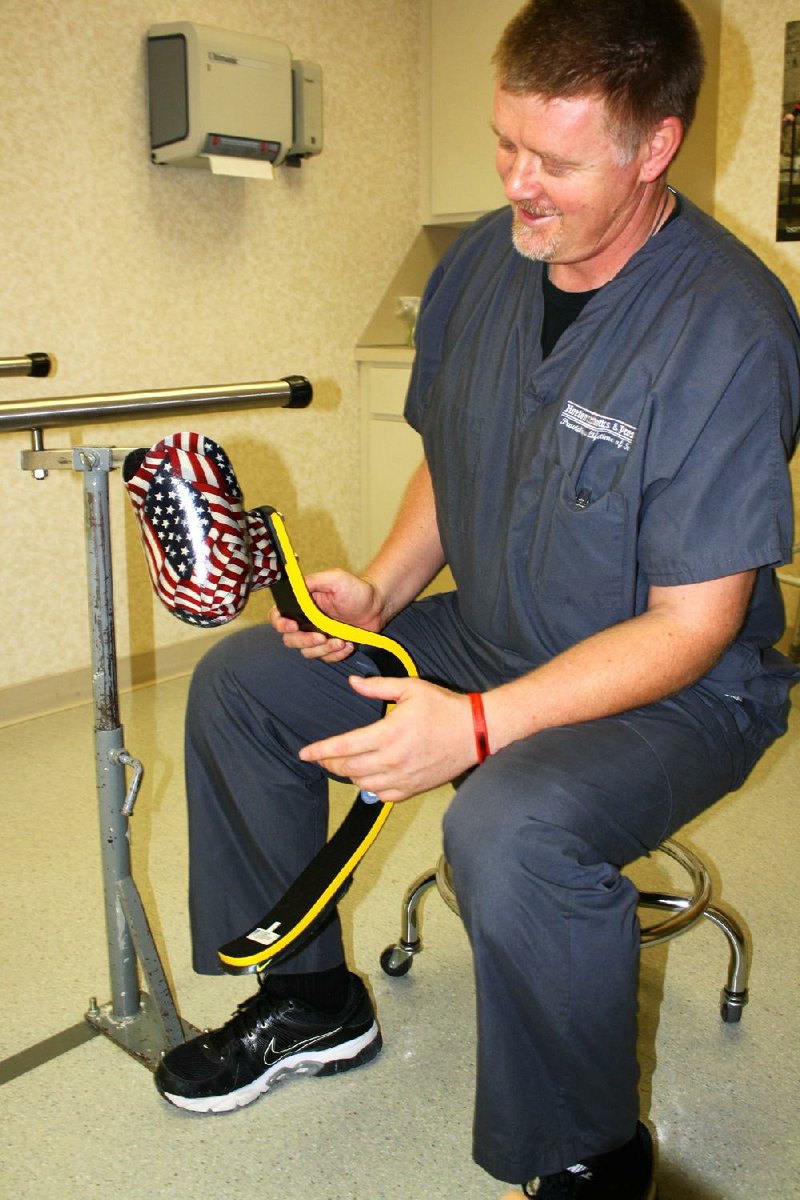FORT SMITH -- Francois Van Der Watt, the world-renowned prosthetist who designed the "blades" that enabled Oscar Pistorius to become the first double-leg amputee to compete as a sprinter in the Olympics in 2012, has only fond memories and well-wishes for the athlete, who's on trial in a murder case.
During his race to fame, Pistorius became known as the "blade runner." With that, Van Der Watt could be considered the "blade maker." He's part inventor, part artist -- a self-proclaimed "body mechanic."
"I really enjoy working with my hands, just having that satisfaction of creating something," said Van Der Watt, 44, showing off the workbench where he creates and tweaks prosthetic limbs for people of all ages and maladies. "What we do makes a difference."
He's the sole practitioner at a branch office of Little Rock-based Horton's Orthotics & Prosthetics. Van Der Watt arrived in Fort Smith in April from Little Rock, where he worked under Horton's founder Gary Horton and alongside sons Mike and Chris Horton.
Pistorius, Van Der Watt's most noteworthy client, is accused in the February 2013 shooting death of his girlfriend, model Reeva Steenkamp, and is undergoing a psychiatric evaluation during a break in his trial in Pretoria, South Africa. Pistorius has said that he thought he was shooting an intruder.
Van Der Watt, a native of Reitz, South Africa, has known Pistorius since the athlete was 14 and Van Der Watt was in private practice near Pistorius' boarding school.
"I got a call one day from his grandmother seeing if I could help her grandson," he said. Pistorius had broken his previous prosthetics and needed a better, longer-lasting replacement. A birth defect led to Pistorius having his legs amputated below the knee when he was a baby.
From 2000 until the time Van Der Watt moved to the United States in 2002, the two worked together to develop the model that would become the Flex-Foot Cheetah carbon fiber running blades. That sleek set of curved blades are what got Pistorius to the 400-meter and 4-by-400-meter relay in the 2012 London Olympics. Carbon fiber is a strong, lightweight material used in sporting goods like baseball bats, helmets and other equipment where a high strength-to-weight ratio is crucial.
Those early inventions were very much trial and error, Van Der Watt said.
"We kind of just threw stuff against the wall to see what stuck," he said, figuratively speaking. He's made three pairs of blades for the runner at a cost of about $20,000 to $30,000 per set. As Pistorius got more competitive, his legs changed and the blades needed to be altered.
Icelandic company Ossur, which had once employed Van Der Watt as a clinical specialist at a Houston manufacturing facility, has been making the blades since 2012. Sponsors, including Ossur, covered the cost of the blades because the prosthetics are not covered by insurance.
"Every person has more than one pair of shoes, so expecting amputees to have just one pair of legs -- or one leg -- to use for everything is discrimination," Van Der Watt said. In addition to Pistorius' running blades, he also has a set of prosthetics he uses for walking and other activities.
Chris Horton with Horton's in Little Rock, said Van Der Watt visited the central Arkansas practice while training the staff on new technology on behalf of Ossur for several years.
"We never thought in a million years he'd want to come to Arkansas and join us," Horton said, "He could go anywhere in the world -- literally -- that he'd want to go."
The job in Fort Smith means no more globetrotting and allows him more time with his wife, Shawn, and their 6-year-old daughter and 5-year-old son. The clan is currently looking for a farm to settle on; Van Der Watt grew up working on his family's produce and dairy farm in South Africa.
Pistorius was first a Paralympics champion before he took legal action to be able to compete in international competitions with other runners. Some said Pistorius' artificial limbs gave him a leg up on his able-bodied competition.
Not true, said Van Der Watt.
"It's a passive product, so there's nothing actively going on," he said. Able-bodied athletes can utilize the muscles in their calves, ankles and feet, where Pistorius cannot. "It's just static."
Pistorius became the first amputee to win an able-bodied world track medal at the 2011 World Championships in Athletics. In 2012, Pistorius became the first double-leg amputee to participate in the Olympics, in the 400-meter race and the 4-by-400-meter relay. Van Der Watt was selected to go to London as the U.S. team's prosthetist.
Several weeks later, at the Summer Paralympics, Pistorius won gold medals in the men's 400-meter race and in the 4-by-100 relay, setting world records in both events. He also took a silver in the 200-meter, having set a world record in the semifinal.
Van Der Watt last saw Pistorius at the Olympic Games, just before the runner met Steenkamp. Van Der Watt had stayed at Pistorius' home in South Africa, "so I'm familiar with all of that," he said of the murder scene. The case has been "sad" and "surreal," he added.
Van Der Watt has kept up with Pistorius mainly through his coach, who says the runner has continued to jog from time to time. But those days may be over if the outcome of the trial doesn't come out the way Pistorius wants.
"It was [Pistorius'] life, so it's kind of hard just to take it away," Van Der Watt said.
SundayMonday Business on 06/23/2014

